Disclosure: This post contains affiliate links and I may earn a small commission if you purchase through these links.
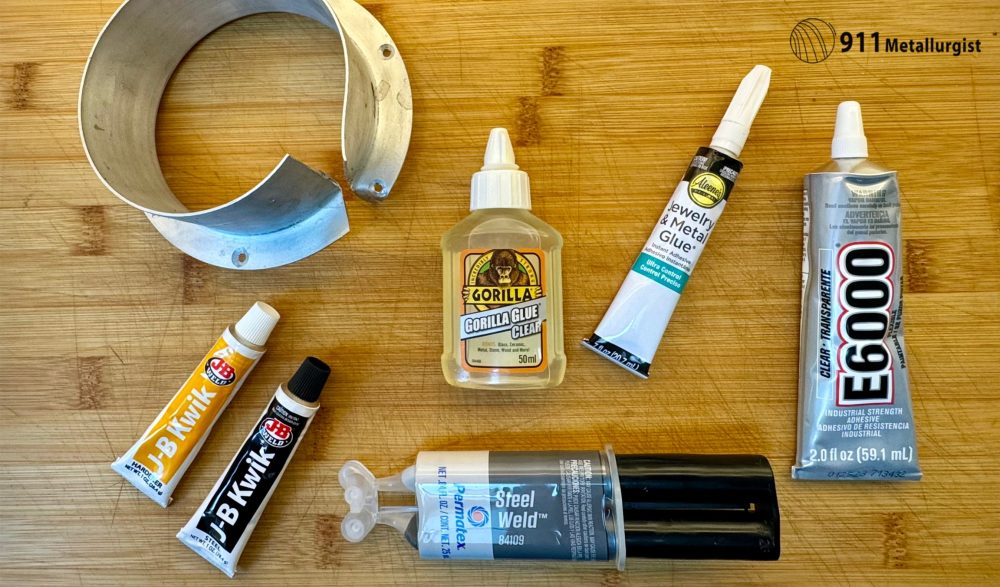
Choosing the correct method can be a minefield when gluing materials to metal. While the good old-fashioned weld or solder may offer a solid solution, the time, expertise, and finesse often outweigh the task. A quality glue, on the other hand, will allow you to achieve a proper bond between metals and tack metals to a wide range of different materials for a fraction of the cost and time.
As metals are non-porous, slick materials, they can often slip free from many household types of glue, so you may have to look beyond the arts and craft box to find suitable glue for the job. As a rule, the following three adhesives work best with metal:
- Epoxy – A two-part adhesive combining resin and hardener to create a quick curing and highly durable bond.
- Polyurethane – This glue is UV- and water-resistant, making it an ideal solution for outdoor use.
- Cyanoacrylate – Known as super glue to you and me, this simple-to-use adhesive offers quick yet strong results – this is the easiest option as it won’t require long drying times.
Choosing a high-quality brand super glue is the best option for most people looking to fix metal to another surface. We like Gorilla Glue, but Loctite also makes a good glue that works well for all types of metal. If possible, scratch the surfaces you want to bond to get the strongest connection.
If you expect your material to be used in a hot environment, you will want to look at alternatives such as Epoxy and Polyurethane but be aware that these are a little trickier to use. Our final recommendations are based on our experiences using glue to stick metal to metal from our in-house tests on the top-performing glues (last updated 3rd October 2023.)
Here are what we think are the best glues for metal in 2023:
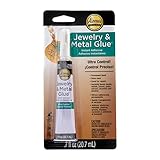





1. Gorilla Clear – Best Super Glue for Metal
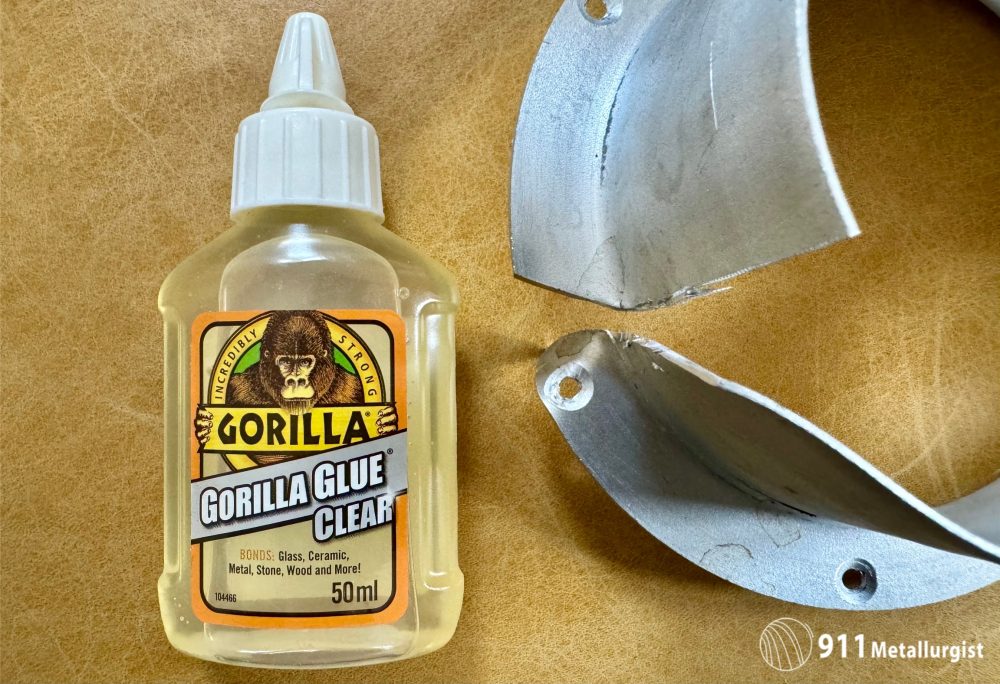
The first glue I grab is when I need to glue metal to metal quickly. In our metal glue test, I was impressed with how quickly the glue set, less than 20 seconds, to create a strong bond.
This adhesive is reinforced to increase strength and resistance to impact damage. It is designed for smooth and controlled application with a long dispensing tool that will fit comfortably in your hand. It has a super-fast setting time, drying in just ten to forty-five seconds without clamping. This versatile adhesive achieves bonds between metal and a wide range of other materials, such as plastic, leather, paper, wood, ceramic, rubber, and a lot more. One of its components is 6G Super Glue.
It is powerful, easy to apply, and comes in a small bottle with a built-in nozzle. The bottle also has an anti-clog cap so that you do not ruin the entire contents of the bottle by sticking the cap to the tube.
This adhesive will bond to many surfaces, including metal, making it an indispensable part of any do-it-yourselfer’s tool kit. It can flow into cracks and crevices, making it even more helpful than just bonding two pieces of metal together.
What we love:
- The bottle has a built-in pincher tool for squeezing out the adhesive.
- Designed for an exact application
- Its clear color allows it to be used with little or no visibility
We don’t like this as much:
- It might not be as strong as Epoxy based glues for long-term usage
2. J-B Weld Original Cold-Weld Steel Reinforced Epoxy – Best for Long Term Metal Fixes
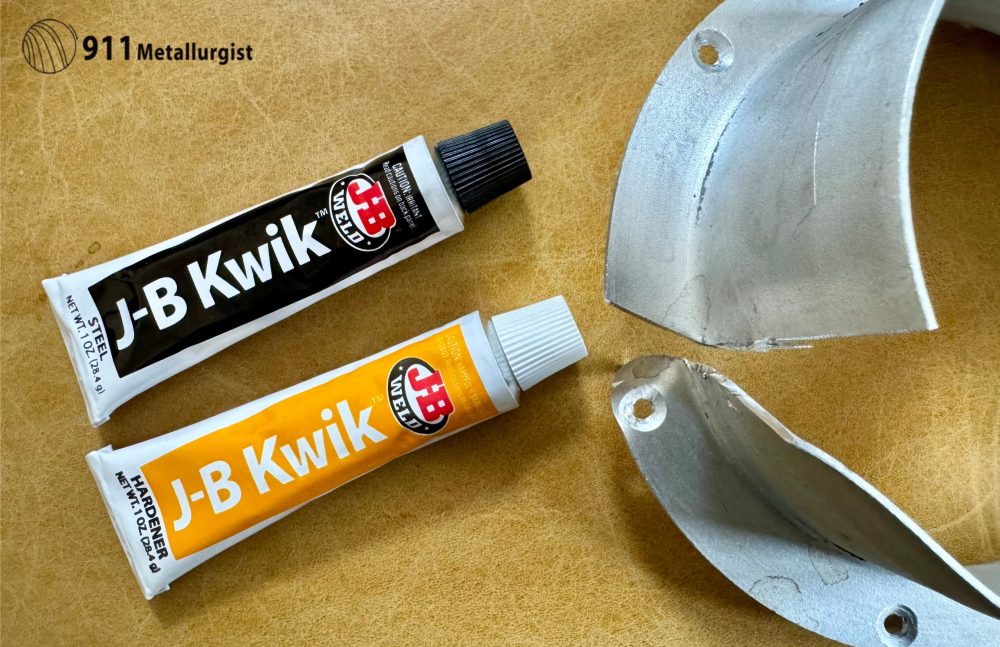
This two-part cold-weld epoxy creates a strong and lasting bond between metal and other types of surfaces while remaining nontoxic. The two components are mixed in a one-to-one ratio, creating a permanent bond. After curing, this bond can be worked on by tapping, filing, drilling, shaping, and painting. J-B Weld takes four to six hours to set at room temperature, allowing it to form a hard bond overnight.
Once it sets, it becomes dark grey. However, full curing takes from fifteen to twenty-four hours. Once it has fully cured it has a tensile strength of 3,960 pounds per square inch and can stand up to temperatures as high as 550 degrees Fahrenheit.
After it is fully cured this glue is waterproof, as well as resistant to damage from petroleum, chemicals, and acids. This makes it an excellent system for repairing all sorts of metal objects, as well as making them by using it to bond metal and other materials together. This makes it a safe and effective tool.
The bond after the final cure felt much stronger than with non-epoxy glue, and I could see this being able to make permanent fixes for metal.
What we love:
- It comes in separate tubes to prevent accidental mixing
- Easy-to-read instructions on the back of the package
- It is easily mixed, making it a very straightforward process.
We don’t like this as much:
- This product is not electrically conductive, so you cannot use it for holding wires in place.
3. Aleene’s Jewelry & Metal Glue – Best Glue for Metal Jewelry
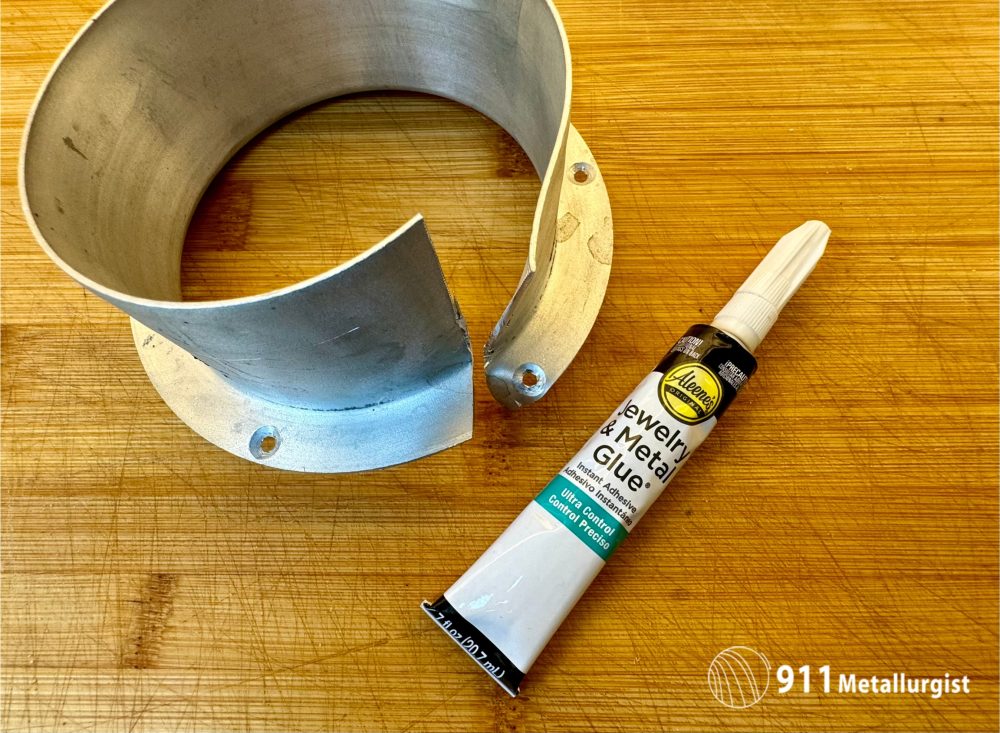
This glue works well with ceramic pieces, metal, leather, jewelry, rubber, mirrors, wires, gems, and much more. This glue bonds quickly, preventing the gel from running as it is applied. It dries clear, remaining strong and permanent. This product comes with three tubes, each containing 0.3 fluid ounces.
This glue is designed primarily with jewelry in mind, but it generally works well with metal. It has many uses of which jewelry is the one that the manufacturer is focusing on. However, it is intended to be able to bond metal to other metals and other materials. Because it dries clearly, the glue itself seems to disappear if the job is finished correctly.
In our tests, we liked how easy it was to use the glue for even small fixes, thanks to the design of the tip.
What we love:
- Before it dries, excess glue can be wiped with a damp cloth or Q-Tip
- It can be used to adhere metal to cloth
- This glue is almost odorless – no more superglue smell!
We don’t like this as much:
- It does not work as well when bonding metal to glass
4. Permatex PermaPoxy 4 Minute Multi-Metal Epoxy – Best Welding Glue for Metal
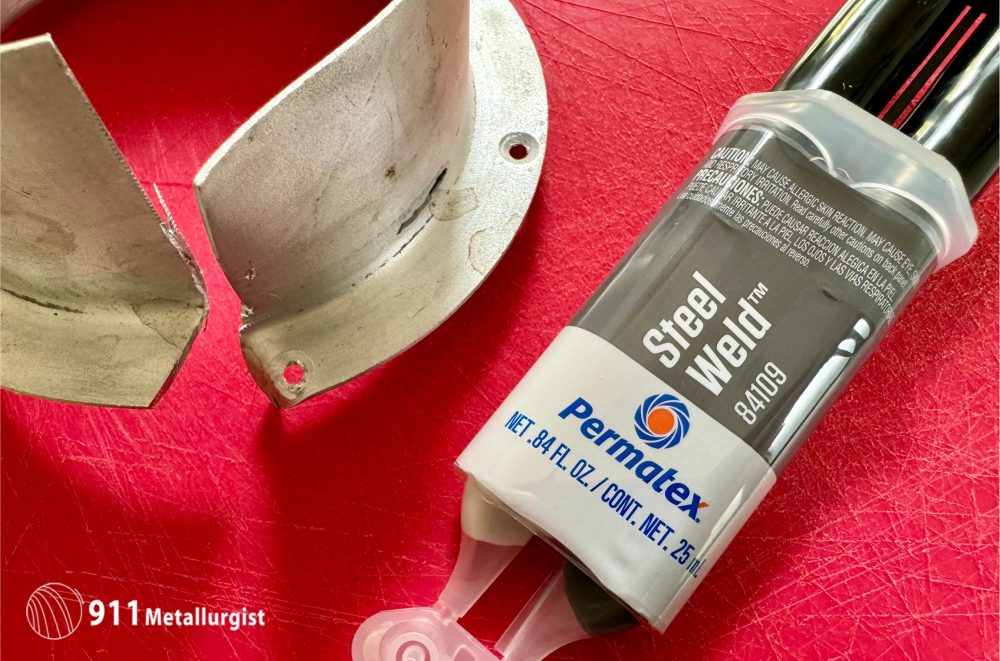
This two-part adhesive is an easy-to-use, multi-metal epoxy that also serves as a filler system; its versatility eliminates most needs for brazing or welding. It sets in just four minutes without clamping, producing a dark grey color. It can also fill in gaps and will not shrink while dries.
After it has cured, this adhesive can be sanded, drilled, threaded, and even filed. It is resistant to water and other solvents. It can handle a temperature range of -60 degrees Fahrenheit to 300 degrees Fahrenheit. Its maximum strength is about 4500 pounds per square inch. This makes it great for complex projects involving multiple pieces. It is handy for filling in metal cracks and sealing welded seams.
Its wide range of uses makes it an excellent adhesive to use if you are not skilled at welding. It is quite capable of not only bonding metal to metal but metal to other ridge materials as well.
What we love:
- This two-part adhesive is pushed out of a combined tube with a double syringe.
- Water resistance grants you extra peace of mind
- It has easy-to-read instructions on the back.
We don’t like this as much:
- It’s best to make the mixture outside, as the mixture can produce a smell
5. E6000 Metal Glue – Best All-Rounder
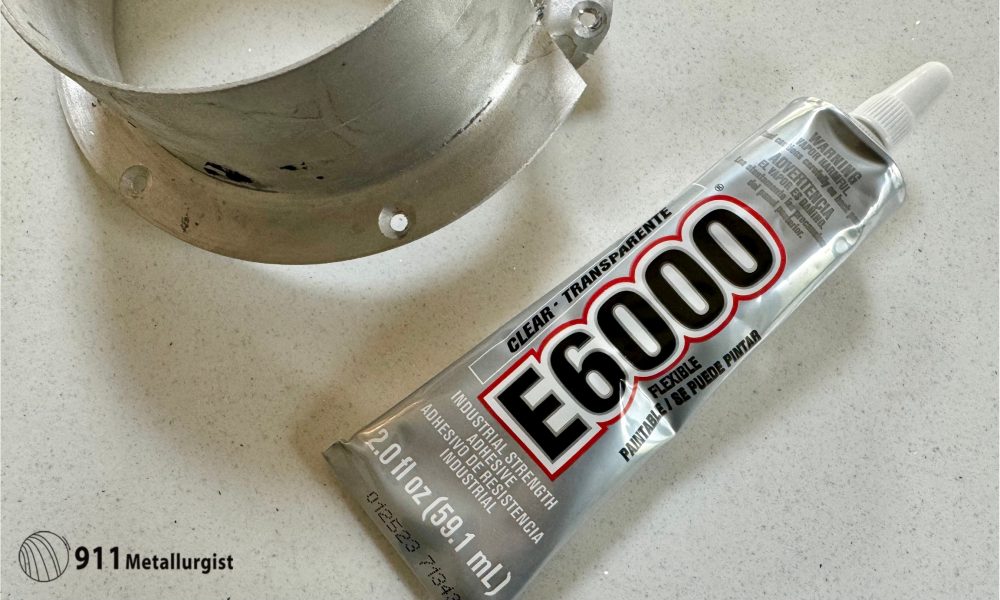
We originally tested this glue for use with ceramics but were also impressed with how well it could glue metal. For quick jobs the E6000 can provide a great alternative to super glue for metal. We tested it with metal to metal and found it gave us a great hold and had none of the strong smells associated with
What we love:
- Cheap and easy to use
- Can also be used on lots of non-metal materials
- Made in the USA
We don’t like this as much:
- It can be tricky when gluing wood to metal – using a super glue like Gorilla Glue Clear for this use case is better.
Frequently asked questions:
What is the best glue to use on metal?
The best adhesive to use when gluing metal to metal is epoxy glue, specifically designed for this particular purpose. Epoxy glue is made from two materials called a resin and a hardener; when combined, they produce a powerful adhesive.
Epoxy glues often come in dispensers that help you mix the resin-to-hardener ratio essential for the epoxy to form a strong bond. Once the resin and hardener are mixed, the glue needs to be used quickly if you are going to get the best possible results from its use. This also means you must use a stable tool while applying the adhesive. It is also very important to ensure the glue does not touch your skin. Once the epoxy glue has been applied, the surfaces glued together should be held together with a clamp.
What should I consider before choosing a metal adhesive?
When considering using a metal adhesive, you’ll also need to understand the characteristics of the surfaces you are trying to join.
What are the qualities of the surfaces you want to bond? As an example, aluminum surfaces need continual oxidization. Different types of metal have textures that need to be smoothed out to get proper adhesion.
What are the size and structural properties of the surface being joined? This will determine how much glue will be needed, how long it needs to set, and the bonding conditions.
What kind of environment will the project be used in? This includes the weight it needs to support and external conditions like temperature and moisture.
Do the materials you are using have pre-coated surfaces? If they do, this will affect the type of glue you need to use.
Answering all these questions is important to the success of your project.
How do I prepare the surface for bonding?
When bonding two metal surfaces, giving it a light sanding using fine-grit sandpaper is helpful. The slight roughness will help them to bind better by making it easier for the adhesive to stick to the metal surfaces.
Next, wipe down the surface using methyl ethyl ketone or acetone, using a clean cloth that will not leave any fibers on the metal. You should do this wipe-down even if you do not sand the surfaces.
Next, you should use a heavier degreaser to remove oil or grease from the surface. After which, you need to quickly wipe the surface with either acetone or methyl ethyl ketone, to remove any remaining degreaser.
Finally, it would be best if you allowed the surfaces to dry completely before applying the adhesive.
After this, you are ready to apply the adhesive. Preparation beforehand is as crucial as your work after it when working with metal. So you mustn’t skip this part of the process. Otherwise, it could affect the final result.
Wrap Up
When looking for an adhesive for gluing metal, there’s a vast range out there for you to choose from, featuring a variety of methods and special features that make them unique. The challenge is to find the right one for the job that you are doing. Each of the adhesives listed above will effectively bond metal to metal, with many also being able to bond to numerous other material types.
Whatever your project may be, whether it is a repair or making something from scratch, it is essential to have the proper adhesive for your job. Finding the suitable adhesive for your project depends upon the size and nature of your project. It is essential to consider how much stress the adhesive will be placed under and how quickly it sets and cures. When deciding what glue to use, look at your project and consider the factors mentioned previously.
Why Trust 911 Metallurgist?
We did the extra work to evaluate the best glues for metal but didn’t stop there. We tested each top performing glue in this list in our inhouse metal to metal glue test. We continue to keep a track of new glues that hit the market and regulary update our list so we can be confident that this is the best guide to metal glue on the internet.
Related buying guides:
911metallurgist.com is a participant in the Amazon Services LLC Associates Program, an affiliate advertising program designed to provide a means for sites to earn advertising fees by advertising and linking to Amazon.com.
